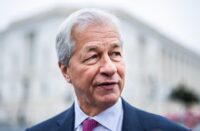Title: Impact of Trump Administration’s Tariff Policies on Auto Insurance
The Trump administration’s tariff policies could potentially inflate car insurance premiums, as per a recent analysis by Insurify, a well-known insurance comparison website. This comes when insurance costs are already sharply rising.
A proposed 25% tariff on imports from Canada and Mexico, likely to take effect from March, could drive up the average annual auto insurance premium by 8% to $2,502 by 2025. Without these tariffs, Insurify predicts that the average annual premiums would increase by 5% to $2,435 by year-end.
These tariffs are expected to escalate the prices of cars and auto parts imported from Canada and Mexico, crucial suppliers for the U.S market. As a result, insurers may have to pay more in claims when policyholders are involved in accidents, leading to increased premiums for consumers.
According to Matt Brannon, data journalist at Insurify, “When people think about tariffs, they usually consider the goods they might purchase from abroad. Often, services like car insurance are overlooked.” He believes these tariff impact estimates are “conservative.”
The Trump administration has recommended several tariffs during its initial month. These include a 10% additional tariff on all imports from China and comprehensive tariffs on Canada and Mexico, which were postponed by a month.
Approximately 60% of auto replacement parts used in U.S repairs are imported from Mexico, Canada, and China, according to the American Property Casualty Insurance Association. Some components cross borders multiple times before final assembly.
Economists suggest that not all proposed tariffs may take effect and could be used by Trump as leverage for concessions from trade partners. However, if implemented, these tariffs could further escalate the already rising costs of cars, parts, and insurance premiums.
Increasing threats of 25% tariffs on the North American borders could disrupt over three decades of free trade across North America, affecting the automobile business, and adding further pressure to an already strained auto industry.
Motor vehicle insurance premiums have increased by 12% over the past year, as per the U.S. Bureau of Labor Statistics’ consumer price index. The costs began to rise rapidly in 2022 and 2023 as more Americans returned to commuting post the Covid pandemic, leading to an increase in accidents, says Brannon.
As investors, it is essential to be aware of the potential implications of these tariffs on the auto industry and insurance premiums.




